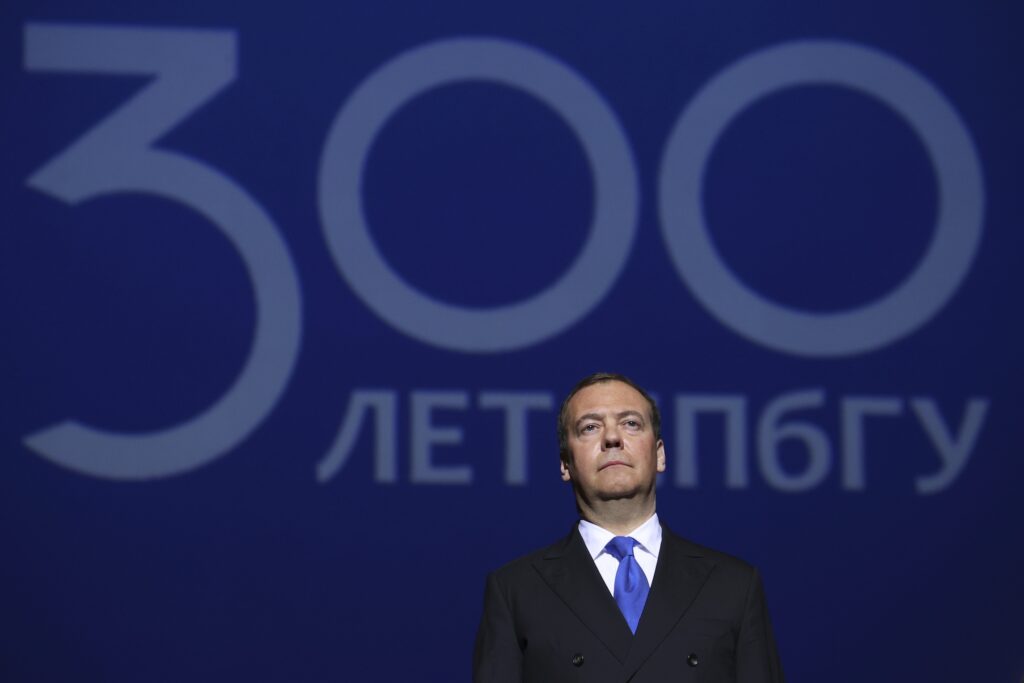Russian President Vladimir Putin has not abandoned his intent to capture Ukraine’s capital city of Kyiv at some point in the war, according to a top Kremlin official.
“Where to stop? I don’t know. Will it be Kiev?” Russian Security Council Deputy Chairman Dmitry Medvedev told Russian state media outlets, using Moscow’s preferred pronunciation of the city’s name. “Yes, it should probably be Kiev as well. If not now, then sometime later, probably during some other stage of this conflict’s development.”
Ukrainian President Volodymyr Zelensky has rejected the idea of a ceasefire deal with Putin on the grounds that Russia would use the deal as a recovery period to prepare for another invasion. Medvedev, for his part, insisted that “the elites who currently dominate in Kyiv must leave” before Moscow can strike a deal that it would deem acceptable.
“Completely different people should appear who are aware of their responsibility for the future of the people inhabiting this complex, still-existing entity called ‘Ukraine,’” said Medvedev, who spent four years as president of Russia. “When there are such people, we can somehow negotiate with them.”

Medvedev articulated that maximalist assessment of Russian objectives just days after posting on social media that Russia would use nuclear weapons against the United States, Germany, the United Kingdom, and Ukraine if Russian forces find themselves forced to “return Russia to the borders of 1991.” He added, in his latest remarks, that Russia also aims to conquer Odesa, the most important Black Sea port city in Ukrainian hands.
“Odesa, come back home,” he said. “We have long desired Odesa in the Russian Federation. Even by virtue of the history of this city, the kind of people who live there, the language they speak, it is our Russian city.”
Russia and Ukraine signed a treaty recognizing the legitimacy of those borders in 1997, but Putin annexed Crimea from Ukraine in 2014 and has attempted to seize four other regions of eastern Ukraine in the two years since Ukrainian forces thwarted Russia’s attempt to seize Kyiv.
The former Russian president’s rhetoric drew a scornful response from Brussels. “Normally we don’t comment on all the weird remarks, especially of people who are desperately seeking attention, especially if they are an eternal ‘number two,’” the European Commission’s foreign policy spokesman, Peter Stano, told reporters on Thursday. “And while it’s nice that this person you mentioned is sharing the diagnosis about his mental state, publicly with us … we can just recommend some counseling and mental care.”
Medvedev has developed a reputation for “wild” rhetoric over the last two years, as former U.S. Ambassador Bill Taylor noted, but his talking points follow Putin’s lead. “Putin has this stated goal of incorporating Ukraine back into the Russian Empire,” Taylor, who led the U.S. Embassy in Kyiv on two different occasions, told the Washington Examiner. “This is what Putin has always both said and indicated he wanted to do.”
Medvedev’s rhetoric about Odesa echoes Putin’s claim in December, when the Kremlin chief insisted that “Odesa is a Russian city” and complained that the Ukrainians “drummed up all sorts of historical nonsense” to have it. And Medvedev suggested that the state of Ukraine, after Russia’s territorial ambitions are satisfied, will be divided among neighbors.
CLICK HERE TO READ MORE FROM THE WASHINGTON EXAMINER
“If as a result of all that is going on something remains of Ukraine, such a state probably has chances to remain, though not very high,” he said, before using a German name for the city of Lviv. “I don’t know what will remain in this territorial entity, I cannot call it a country now, maybe the Lemberg region, with a center in the city of Lemberg if the Polish or some other regions undertake for it. But this is a complicated process, not only military, but also political.
That kind of rhetoric helps explain Ukraine’s resistance. “This is the Russian desire,” Taylor said, although he underscored that Russia lacks the military ability to achieve that goal under current circumstances. “And Ukrainians are fighting to frustrate that desire.”
